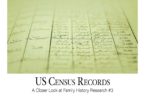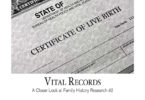When you first begin your family history research, you may be beginning from nothing except what you already know from growing up in your family. This means you probably know the names of your parents and siblings, maybe your grandparents, possibly a few of your great-grandparents (though probably not all of them), and maybe the birthdays and places for these people (though not always, even for your parents). When you only have this little bit of information to go on, beginning a family history research project can seem like a daunting task, and you don’t know where to begin to start adding information to your family tree.
One of the best things you can do to begin your family history research project is to interview your relatives. Ideally, you will interview the eldest people in your immediate family. If you are lucky enough to have a branch of your family with a genealogist who is still living, be sure to interview them, too, even if they are not of the eldest generation. Their information can launch you quite far into the family history on the particular branch of your family they belong to. Family genealogists are fantastic resources, and most of them are quite willing to share what they have with you. The vast majority of genealogists are eager to share their work and knowledge (though, as with anything, there are always exceptions to this rule).
Once you’ve lined up the list of elder family members you want to interview to launch your family history research project, what do you ask them? You want to ask them questions that will help you jump off of the oral record and into the written records in the world’s official record repositories. Therefore, you will want to ask them questions that will get you as far back into your family history as possible while also learning what you can about what your ancestors, who they remember, were like as people.
These are some questions you should definitely be asking when you do family interviews with elder relatives:
- Who were your parents and grandparents? What were their names, birthdates, and birthplaces?
- Do you know the date and/or place of marriage of your parents or grandparents?
- Where did your parents and grandparents live? Where were they born? Where did they grow up? Did they move anywhere during their lives? If so, where and when did they make these moves? Where was the last place they lived?
- Did your parents or grandparents have any siblings? If so, what were their names and birthdates, and places?
- Do you know where any of the people you’ve talked about are buried? Do they have headstones?
- Were any of these people in the military? Did they serve in a war? Which one(s)?
- Do you know any of the names of your great-grandparents?
- Do you have any family stories about any of these people you would like to share?
- Do you know any stories you were told as a child about the parents or grandparents of your own parents or grandparents?
- Tell me about yourself, including what your childhood was like and any other personal stories you would like to share.
Be sure to bring a pen and paper, or a voice recorder, to be able to save all this information and transcribe it later into your family tree. Then, be sure to follow up any information given to you in the official records, and use those records to discover earlier generations of your family tree.



